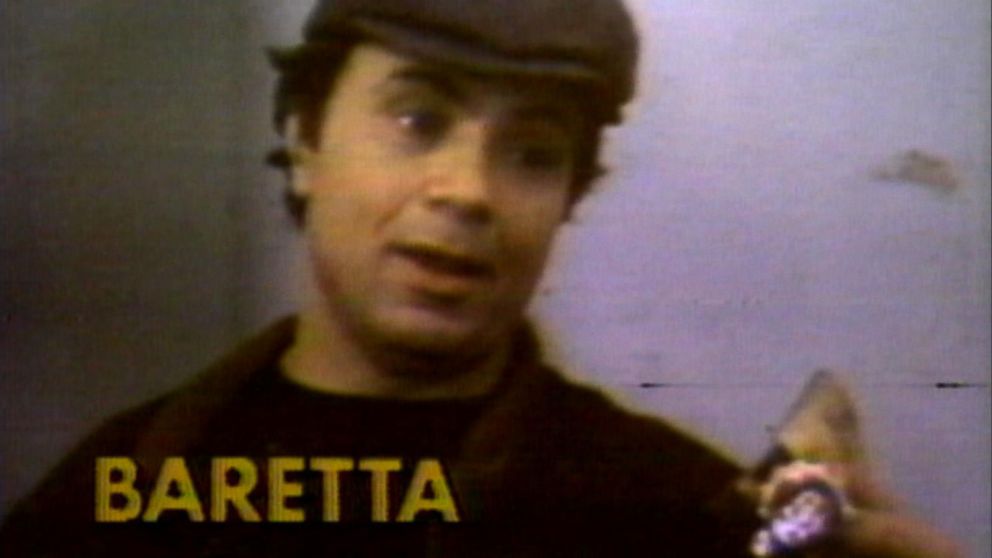
Transcript for How ‘Baretta’ made Robert Blake a household name: Part 3
In the 1970s, the cop show was king and every network had to have its own cop show or shows. You had “Mannix.” You had “Starsky and hutch.” You had “The streets of San franciso.” “Kojack.” And of course, there was “Baretta.” Everybody my age, if you say the word “Baretta,” they break into song. You’d watch those promos — “Baretta, Thursdays at 9:00.” Baretta does everything to save three runaways. So “Baretta” was one of those police shows where the cop breaks the rules to make sure that the bad guys are caught. I’ll cut you a little. It was very much in time and in feel with the 1970s, right. This is the new kind of cop . It was a hit. And the winner is Robert Blake in “Baretta.” The show earned Robert Blake an Emmy award in 1975. Ah, let the good times roll. I saw him in “Beretta.” I watched “Baretta” as a kid. What I liked about it, I liked his style. And he was a fighter. Baretta had a lot of quirks. The man lived with a cockatoo. What was the deal with the cockatoo? I love you! He was brilliant. He was called la-la. There were five or six birds, and all of them did something else. But la-la was the genius. And he also was a troubled animal, because he was trapped in being a bird. He should’ve been a person. And, if he got mad at you, you could see that he had that look in his eye, and he would grab your finger, and he’d look at you like, “You want to argue with me?” Say goodbye. Hello! So he was kind of nuts half of the time. But you could get him to do anything. He understood the camera. Baretta was tough and certainly not afraid to use his fists when required. But he had a good heart and he was almost on the side of the weak and the vulnerable. I designed baretta as my ideal self. It was a lot of things that I wanted to be. But people thought that was me, and they expected to find that when they met me. And it just — it wasn’t true. In the hierarchy of Hollywood, movies are number one. TV is number two. Blake considered a TV series a big step down for him. But he poured his heart and soul into it. He would come in in the morning knowing his dialogue to a “T” because he had rewritten it the night before. And it would be better. I never met a man I didn’t like and I don’t like you. He was a perfectionist. If he read a script and didn’t like it, he would come into the office and throw it down on the table and say, “Who wrote this .” Jimmy garner, who was a dear friend, he said, “You can’t be a perfectionist on television. Stop trying to make it in cold blood, because you’re not going to get that done.” But I wasn’t built that way. And I drove myself crazy. Every script had to be better. Every direction had to be better. Every casting had to be better. I’d hire and fire people right on the spot in front of the camera. It was too much for Blake and he ended the show. Blake took several years off. He stayed in the public eye by appearing on “The tonight show.” He was on a total of 150 times. Welcome Robert glak. Robert Blake. Robert Blake on “The tonight show” was famous for shooting from the lip. It was nobody around to stop me. Wasn’t nobody could have stopped me anyway. You killed him. I was going. I knew I wasn’t going to hit him. I was looking at his throat and I was thinking, “wouldn’t it be nice if I had his Adam’s apple in my hand?” I say, “Hey, Jim, you can’t talk no more.” I said, “Look at him. Look at him. They think he’s really like that.” He’s acting! His image as a troublemaker became cemented thanks to “The tonight show.” And I did “Helltown.” “Helltown” was about a priest who saves souls on the gritty streets of Los Angeles. Heavenly father, let us go among you. I wrote it. I produced it. I directed it. And I was responsible for the money and all kinds of things. And it was about a priest. I thought I was doing god’s work. It was just — I was crazy. And I had a nervous breakdown on camera. And I walked off the set. And I walked off the show. I was always at least 50% self-destructive but when it wasn’t working, I didn’t know what I felt. Bipolar? I was tripolar. I was quadpoalr. Who the hell knows what kind of polar I was. I had 35 different feelings in 5 minutes. I was nuts when I was away from the camera. Blake went through a messy divorce. And he went back into therapy. He quick acting eight years and got into politics. Supporting ceser Chavez and working against nuclear power. I made a lot of money. I was already a millionaire. But I was lost. I was lost in life. So by the late ’90s, Blake is acting very, very rarely. He works out. He plays his guitar. He goes to jazz clubs. He’s sort of a figure on the periphery of Hollywood. But he’s not working at all. So one night, he went to a club, chadney’s, and this blonde woman approached him. And it turns out her name is Bonnie Lee Bakley. It would have been a good night to have stayed home.
This transcript has been automatically generated and may not be 100% accurate.





